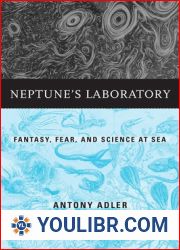
BOOKS - Neptune's Laboratory: Fantasy, Fear, and Science at Sea

Neptune's Laboratory: Fantasy, Fear, and Science at Sea
Author: Antony Adler
Year: November 19, 2019
Format: PDF
File size: PDF 3.2 MB
Language: English

Year: November 19, 2019
Format: PDF
File size: PDF 3.2 MB
Language: English

Neptune's Laboratory: Fantasy, Fear, and Science at Sea In Neptune's Laboratory, Antony Adler delves into the history of humanity's relationship with the ocean, exploring how our imagination and fears have shaped our understanding of the depths of the sea and its potential impact on our survival. The book begins by examining the early nineteenth century when scientists first began to explore the oceans, industrializing marine fisheries and sparking concerns about the sustainability of these resources. As international cooperation emerged in response to these fears, Adler shows how this collaboration gave rise to a global program of marine research. However, during World War I and the Cold War, these efforts were repeatedly disrupted, leading to a waning of the internationalist aspirations. Despite these setbacks, the ocean continues to captivate us today, with advances in technology allowing for continuous observation and experimentation. Probes ride ocean currents, while autonomous and remotely operated vehicles peer into the abyss, fueling both scientific inquiry and our deepest anxieties and fantasies.
Лаборатория Нептуна: фантазия, страх и наука в море В лаборатории Нептуна Антоний Адлер углубляется в историю взаимоотношений человечества с океаном, исследуя, как наше воображение и страхи сформировали наше понимание глубин моря и его потенциальное влияние на наше выживание. Книга начинается с изучения начала девятнадцатого века, когда ученые впервые начали исследовать океаны, индустриализируя морское рыболовство и вызывая обеспокоенность по поводу устойчивости этих ресурсов. По мере появления международного сотрудничества в ответ на эти опасения Адлер показывает, как это сотрудничество дало начало глобальной программе морских исследований. Однако во время Первой мировой и холодной войн эти усилия неоднократно срывались, что приводило к ослаблению интернационалистских устремлений. Несмотря на эти неудачи, океан продолжает очаровывать нас сегодня, с достижениями в области технологий, позволяющими непрерывно наблюдать и экспериментировать. Зонды движутся океаническими течениями, в то время как автономные и дистанционно управляемые аппараты заглядывают в пропасть, подпитывая как научные исследования, так и наши глубочайшие тревоги и фантазии.
Laboratoire de Neptune : fantaisie, peur et science en mer Dans le laboratoire de Neptune, Antoine Adler explore l'histoire de la relation de l'humanité avec l'océan, explorant comment notre imagination et nos craintes ont façonné notre compréhension des profondeurs de la mer et de son impact potentiel sur notre survie. livre commence par une étude du début du XIXe siècle, lorsque les scientifiques ont commencé à explorer les océans, à industrialiser la pêche marine et à susciter des inquiétudes sur la durabilité de ces ressources. Au fur et à mesure de l'émergence de la coopération internationale en réponse à ces préoccupations, Adler montre comment cette coopération a donné naissance à un programme mondial de recherche marine. Cependant, au cours de la Première Guerre mondiale et de la guerre froide, ces efforts ont été interrompus à plusieurs reprises, ce qui a affaibli les aspirations internationalistes. Malgré ces échecs, l'océan continue de nous fasciner aujourd'hui, avec des progrès technologiques qui nous permettent d'observer et d'expérimenter en permanence. s sondes se déplacent par les courants océaniques, tandis que les appareils autonomes et télécommandés regardent dans le fossé, alimentant à la fois la recherche scientifique et nos angoisses et fantasmes les plus profonds.
Laboratorio de Neptuno: fantasía, miedo y ciencia en el mar En el laboratorio de Neptuno, Antony Adler profundiza en la historia de la relación de la humanidad con el océano, investigando cómo nuestra imaginación y miedos moldearon nuestra comprensión de las profundidades del mar y su potencial influencia en nuestra supervivencia. libro comienza con un estudio de principios del siglo XIX, cuando los científicos comenzaron a explorar los océanos por primera vez, industrializando la pesca marina y generando preocupación sobre la sostenibilidad de estos recursos. A medida que surge la cooperación internacional en respuesta a estas preocupaciones, Adler muestra cómo esta cooperación dio inicio a un programa mundial de investigación marina. n embargo, durante la Primera Guerra Mundial y la Guerra Fría, estos esfuerzos fueron frustrados repetidamente, lo que llevó al debilitamiento de las aspiraciones internacionalistas. A pesar de estos retrocesos, el océano sigue fascinándonos hoy, con avances tecnológicos que permiten la observación y experimentación continua. sondas se mueven por las corrientes oceánicas, mientras que los vehículos autónomos y teledirigidos se asoman al abismo, alimentando tanto la investigación científica como nuestras más profundas ansiedades y fantasías.
Laboratório de Neptun: fantasia, medo e ciência no mar No laboratório de Neptuno, Antônio Adler está se aprofundando na história da relação da humanidade com o oceano, explorando como nossa imaginação e medos moldaram nossa compreensão das profundezas do mar e sua potencial influência na nossa sobrevivência. O livro começa no início do século XIX. Quando os cientistas começaram a explorar os oceanos, industrializando a pesca marinha e despertando preocupações sobre a sustentabilidade desses recursos. À medida que a cooperação internacional surge para responder a essas preocupações, Adler mostra como essa cooperação deu início a um programa global de pesquisa marítima. No entanto, durante a Primeira Guerra Mundial e a Guerra Fria, esses esforços foram frustrados repetidamente, reduzindo as aspirações internacionalistas. Apesar desses fracassos, o oceano continua a encantar-nos hoje, com avanços tecnológicos que permitem a observação e experimentação contínuas. As sondas são movidas por correntes oceânicas, enquanto as máquinas autônomas e controladas por controle remoto estão a olhar para o abismo, alimentando tanto a pesquisa científica como as nossas mais profundas ansiedades e fantasias.
Laboratorio di Nettuno: fantasia, paura e scienza in mare Nel laboratorio di Nettuno, Antonio Adler approfondisce la storia del rapporto tra l'umanità e l'oceano, esplorando come la nostra immaginazione e le nostre paure abbiano formato la nostra comprensione delle profondità del mare e il suo potenziale impatto sulla nostra sopravvivenza. Il libro inizia con uno studio dei primi anni del Novecento, quando gli scienziati cominciarono a esplorare gli oceani, industrializzando la pesca marina e suscitando preoccupazioni sulla sostenibilità di queste risorse. Con la collaborazione internazionale in risposta a queste preoccupazioni, Adler mostra come questa collaborazione abbia dato il via a un programma globale di ricerca marina. Tuttavia, durante la Prima Guerra Mondiale e la Guerra Fredda, questi sforzi sono stati ripetutamente interrotti, con l'effetto di indebolire le aspirazioni internazionaliste. Nonostante questi fallimenti, l'oceano continua ad affascinarci oggi, con i progressi tecnologici che permettono di osservare e sperimentare continuamente. sonde sono guidate dalle correnti oceaniche, mentre i macchinari autonomi e a controllo remoto entrano nel baratro, alimentando sia la ricerca scientifica che le nostre più profonde ansie e fantasie.
Neptunlabor: Fantasie, Angst und Wissenschaft im Meer Im Neptunlabor taucht Antony Adler in die Geschichte der Beziehung der Menschheit zum Ozean ein und untersucht, wie unsere Vorstellungskraft und Ängste unser Verständnis der Tiefen des Meeres und seiner potenziellen Auswirkungen auf unser Überleben geprägt haben. Das Buch beginnt mit einer Studie aus dem frühen 19. Jahrhundert, als Wissenschaftler zum ersten Mal damit begannen, die Ozeane zu erforschen, die Seefischerei zu industrialisieren und Bedenken hinsichtlich der Nachhaltigkeit dieser Ressourcen zu wecken. Mit dem Aufkommen der internationalen Zusammenarbeit als Reaktion auf diese Bedenken zeigt Adler, wie diese Zusammenarbeit zu einem globalen Meeresforschungsprogramm geführt hat. Während des Ersten Weltkriegs und des Kalten Krieges wurden diese Bemühungen jedoch wiederholt vereitelt, was zu einer Schwächung der internationalistischen Bestrebungen führte. Trotz dieser Rückschläge fasziniert uns der Ozean bis heute, mit Fortschritten in der Technologie, die kontinuierliches Beobachten und Experimentieren ermöglichen. Sonden werden von Meeresströmungen bewegt, während autonome und ferngesteuerte Fahrzeuge in den Abgrund blicken und sowohl die wissenschaftliche Forschung als auch unsere tiefsten Ängste und Fantasien anheizen.
''
Neptün Laboratuvarı: Denizde Fantezi, Korku ve Bilim Neptün'ün laboratuvarında Antony Adler, insanlığın okyanusla olan ilişkisinin tarihini araştırıyor, hayal gücümüzün ve korkularımızın denizin derinliklerine dair anlayışımızı ve hayatta kalmamız üzerindeki potansiyel etkisini nasıl şekillendirdiğini araştırıyor. Kitap, bilim adamlarının okyanusları keşfetmeye, deniz balıkçılığını sanayileştirmeye ve bu kaynakların sürdürülebilirliği konusundaki endişeleri artırmaya başladığı on dokuzuncu yüzyılın başlarını inceleyerek başlıyor. Bu endişelere yanıt olarak uluslararası işbirliği ortaya çıktıkça, Adler bu işbirliğinin küresel bir deniz araştırması programına nasıl yol açtığını gösteriyor. Bununla birlikte, I. Dünya Savaşı ve Soğuk Savaş sırasında, bu çabalar defalarca engellendi ve enternasyonalist özlemlerin zayıflamasına yol açtı. Bu aksiliklere rağmen, okyanus bugün bizi büyülemeye devam ediyor, teknolojideki gelişmeler sürekli gözlem ve deneylere izin veriyor. Sondalar okyanus akıntıları ile hareket ederken, otonom ve uzaktan kumandalı araçlar uçuruma bakar, hem bilimsel araştırmaları hem de en derin endişelerimizi ve fantezilerimizi besler.
مختبر نبتون: الخيال والخوف والعلوم في البحر في مختبر نبتون، يتعمق أنتوني أدلر في تاريخ علاقة البشرية بالمحيط، ويستكشف كيف شكلت خيالاتنا ومخاوفنا فهمنا لأعماق البحر وتأثيره المحتمل على بقاءنا. يبدأ الكتاب بفحص أوائل القرن التاسع عشر، عندما بدأ العلماء لأول مرة في استكشاف المحيطات، وتصنيع مصايد الأسماك البحرية وإثارة المخاوف بشأن استدامة هذه الموارد. مع ظهور التعاون الدولي استجابة لهذه المخاوف، يوضح أدلر كيف أدى هذا التعاون إلى ظهور برنامج عالمي للبحوث البحرية. ومع ذلك، خلال الحرب العالمية الأولى والحرب الباردة، تم إحباط هذه الجهود مرارًا وتكرارًا، مما أدى إلى إضعاف التطلعات الدولية. على الرغم من هذه النكسات، لا يزال المحيط يفتننا اليوم، مع التقدم التكنولوجي الذي يسمح بالمراقبة والتجريب المستمرين. تتحرك المجسات بواسطة تيارات المحيط، بينما تنظر المركبات ذاتية القيادة والتي تعمل عن بعد إلى الهاوية، مما يغذي البحث العلمي وأعمق مخاوفنا وأوهامنا.






















